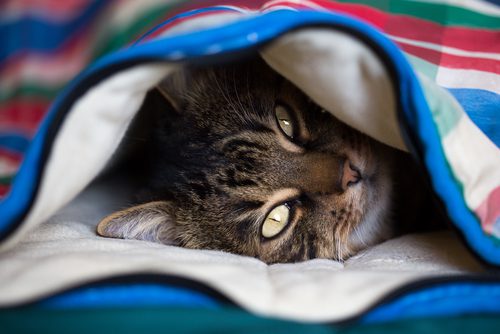
Cats, for those who are not really a fan of their mysterious feline ways, are standoffish loners who won’t even indulge their human with a backward glance when they saunter out of a room.
Dogs, on the other hand, rarely leave anywhere without checking that their human pal is coming along too. Dogs love to go everywhere we do, while cats prefer to remain in the comfort of home and familiar surroundings.
So, are cats unsociable, unaffectionate individuals who merely see humans as easy-to-access meal deliverers?
Misunderstanding our cats
Not so, according to cat experts. The key to understanding and appreciating cats is to stop comparing them to dogs when it comes to the pet-human relationship. Author and host of Animal Planet's Psycho Kitty, Pam Johnson-Bennett says: “Dogs are great at being dogs and cats are great at being cats. They are solitary hunters because they are small predators and they only hunt enough for one. That's why people have that misunderstanding, but they're very social. They’re also territorial so we have to create that security. Dogs love to go with you in the car, but your cat really prefers to stay at home and just know that you're going to be coming back.”
And, while it’s pretty easy to figure out how your dog is feeling – that wagging tail and big smile is such a giveaway – cats are much harder to read. For example, while most dogs give canine-appreciating visitors a warm, sloppy welcome, have you ever wondered why your cat makes a beeline for the one person in your lounge who doesn’t like felines? According to Johnson-Bennet, it’s because they’re sitting still and not trying to stroke or engage with them: “Cats often like people who dislike them because non-cat people give territorial cats the space and time they need to make up their own minds about them.”
Making choices on their own terms
This is a great example of the difference between cats and dogs. Cats are, by their nature, more independent than dogs – in part because their wild relatives don’t live naturally in the same sort of family groups that canines do. Groups of dogs have to communicate with each other, cats not so much – so they’re hardwired to think about number one. It’s no wonder then that cats thrive on the chance to make their own choices on their own terms. To appreciate our cats better, the key is to try and think like them and understand what’s important to them – and why.
A chance to feel safe
As a territorial species, environment is everything and home should be a safe space that enables your cat to perform natural behaviours. As well as providing the basics – food, water and a litter tray, cats also require places to hide, places to get up high so they can observe the world from a safe spot, and somewhere to scratch. Cats recharge by sleeping for up to 16 hours a day, so providing them with a range of cosy places to nap undisturbed is essential. Find out more
A chance to keep control
As small hunters who operate alone, cats have to manage the dual roles of being both predator and prey – and, unlike dogs who, in the wild, would work as a pack, they have back-up. Understandably, they like to feel in control of their environment. Not only do cats feel safe when they are surrounded by familiar things, they like their home and routines to be predictable and consistent. Cats can find change extremely stressful – even a new carpet or sofa can set alarm bells ringing.
A chance to scent
Smell is one of your cat’s most important senses and they will spend enormous amounts of time rubbing the scent glands on their cheeks all around their home and on their human, leaving ‘happy messages’. Encouraging scenting helps your cat feel content and in control and using synthetic pheromones such as Feliway or Pet Remedy can help. Find out more
A chance to make decisions
Your choices, for example, where your cat feeds or toilets, may not always suit your cat so be prepared for some trial and error. Place your cat’s resources and facilities, such as food, water, litter tray, scratching post, bed and hiding place in different locations around the house, ensuring your cat can access them whenever they need to. If your cat isn’t using them, try moving them around.
A chance to work for food
According to feline welfare charity International Cat Care, cats would naturally spend up to six hours a day foraging, stalking, catching and eating prey. They would eat 10 or more mice a day, probably involving about thirty attempts at capture. Therefore, the predictable availability of food only twice a day in a food bowl in the kitchen does not represent any kind of challenge. Providing food in feeding balls or cat puzzles can provide a much more rewarding experience. Find out more
A chance to play
Every cat is an individual, but most love regular playtime and it’s extremely valuable for human-feline bonding. Choose toys and games that are as close to the natural hunting experience as possible, such as fishing rod toys made with furry material or feathers. Find out more
A chance to be themselves
Each cat is unique – some are anxious, others are bursting with confidence. Just like us, they don’t always get on with everyone they meet, and they like to pick their own friends, not necessarily the companions we choose for them. By providing your cat with the opportunity to be a master or mistress of their own destiny – in terms of their home and resources and how and when they use them – you’ll enable your cat’s true personality to shine through and discover just what a wonderful companion your fabulous feline can be.
If you found this interesting, you may also like:
Sources: icatcare.org, thecatvet.co.uk, cbc.ca/news














